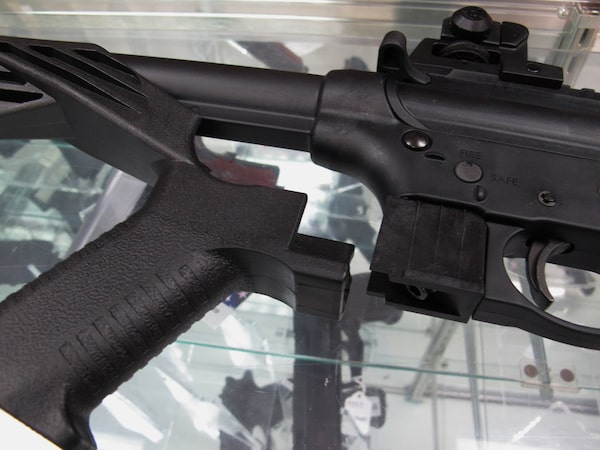
This Feb. 1, 2013, file photo shows a "bump" stock next to a disassembled .22-caliber rifle at North Raleigh Guns in Raleigh, N.C. The gunman who unleashed hundreds of rounds of gunfire on a crowd of concertgoers in Las Vegas on Monday, Oct. 2, 2017, attached what is called a "bump-stock" to two of his weapons, in effect converting semiautomatic firearms into fully automatic ones.
Nevada, like many U.S. states, has relatively permissive gun laws.
Only seven U.S. states have passed laws banning assault weapons and Nevada is not among them.
According to the Law Center to Prevent Gun Violence, a public-interest group that advocates for stricter gun control, Nevada has no waiting period for firearms purchases and does not limit the sale of assault rifles, .50-calibre weapons or high-capacity magazines. It ranks Nevada 18th on its state-by-state scorecard for gun-safety laws.
Las Vegas mass shooting: What we know so far
The motive doesn't matter: Mass shootings are always terror
Acts of heroism saved countless lives during Las Vegas shooting
It's legal to openly carry a gun almost anywhere in Nevada, with the exception of some public buildings such as airports and schools. Concealed carry permits are considered "shall issue" in Nevada, which means, effectively, they will be issued to most applicants who pass basic background checks. The state also has "stand your ground" provisions that grant legal protection to those who use force when threatened.
Under a federal law, Nevada requires those purchasing guns from licensed dealers to undergo a background check. Those transactions must be cleared by the Nevada Department of Public Safety to ensure that gun purchasers are not banned from possessing weapons for reasons such as past criminal convictions. They also check a federal database administered through the FBI – the National Instant Criminal Background Check System (NICS).
Gun purchases between private buyers and sellers can require background checks through the state databases if the seller requests it.
Those who are subject to a domestic-violence protection order must give up their weapons for reasons of safety and Nevada courts are obliged to pass on information about criminal convictions that involve mental illness to the federal NICS database.
It's still not clear what weapon or weapons were used in Sunday's mass shooting, although the rapid rate of fire heard in video footage suggests the attacker may have used an automatic weapon or machine gun.
These types of weapons can fire multiple rounds with a single pull of the trigger. Alternatively, he may have used a semi-automatic weapon modified with a "crank" or "bump-stock" to allow the weapon to be fired more quickly in the manner of a fully-automatic.
The shooter reportedly had hundreds of rounds of ammunition and 23 firearms in his Mandalay Bay hotel room, including two weapons on tripods trained at the crowd assembled for a country music concert 32 floors below.
In a statement, a Nevada gun store called Guns & Guitars said that Mr. Paddock purchased firearms from the store and passed all background checks.
"He never gave any indication or reason to believe he was unstable or unfit at any time," the store's owner, Chris Sullivan, said in the statement.
Over the past three decades, there have been federal efforts to enact some forms of gun control in the United States, but in recent years, new initiatives have foundered in Congress. The manufacture and sale of some types of high-powered semi-automatic weapons were halted under the 1994 Federal Assault Weapons Ban, but that ban lapsed a decade later in 2004. Efforts to renew it have failed, including after the mass shooting at Sandy Hook elementary school. The manufacture and sale of fully automatic weapons was stopped after 1986, although guns made before that time can still be sold, even if their ownership is heavily regulated. To own one a person must apply for a special permit from the Bureau of Alcohol, Tobacco, Firearms and Explosives.
In the November, 2016, election, Nevada voters approved a gun-control measure known as Ballot Question One. The initiative, backed by former New York mayor Michael Bloomberg, requires background checks in private gun sales, but has proven difficult to enforce.
Jennifer Carlson, a professor of sociology at the University of Arizona who studies gun culture and politics, said issues of gun laws and policy are intertwined with the place of guns in American society.
She pointed out that more than 13 million Americans are now licensed to carry concealed weapons, according to recent estimates.
There has been a noticeable shift in public attitudes to seeing guns less as objects of danger and more as sources of safety, Prof. Carlson said.
"The reality is we have more guns than people in the United States and I don't think we're going to have gun laws that are going to change that reality, not soon and maybe not in my lifetime," Prof. Carlson said. "We are a gun saturated society. Maybe we can change gun laws, but the guns are here."
According to Pew Research, 44 per cent of Americans say they know someone was been shot either accidentally or intentionally.
 Joe Friesen
Joe Friesen